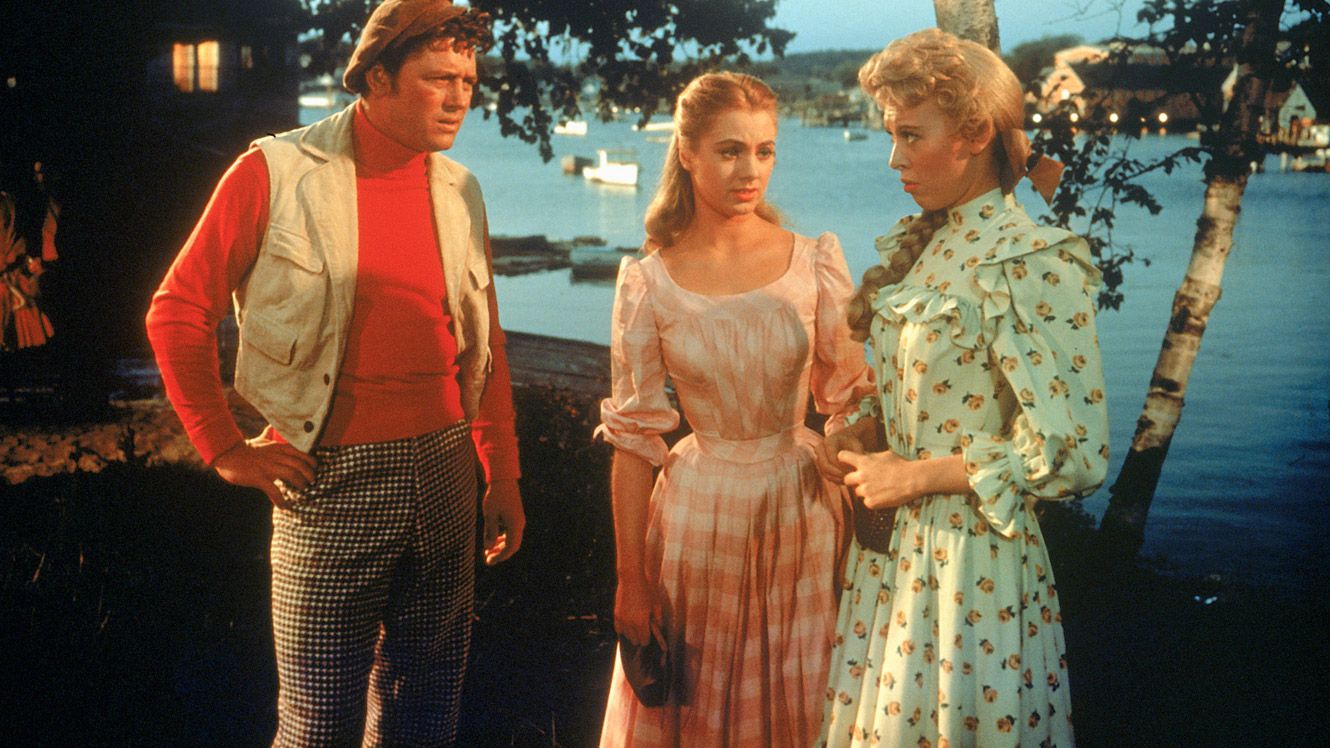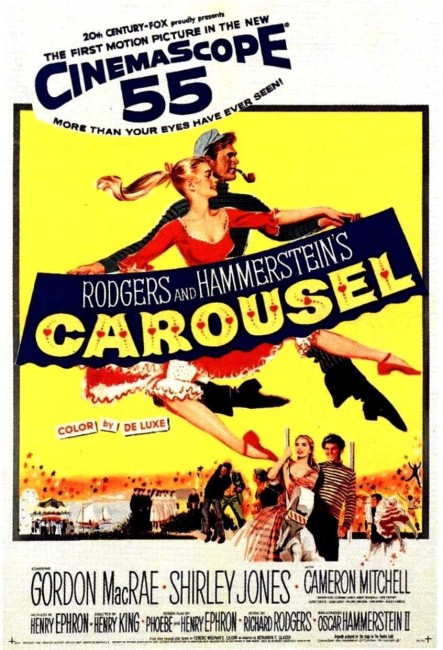USA. 1956.
Crew
Director – Henry King, Screenplay – Henry Ephron & Phoebe Ephron, Based on the Musical by Oscar Hammerstein II & Richard Rodgers, (Based on the Play Liliom by Ferenc Molnar, Adaptation – Benjamin F. Glazer), Producer – Henry Ephron, Photography – Charles G. Clarke, Music – Richard Rodgers, Lyrics – Oscar Hammerstein II, Music Supervisor – Alfred Newman, Photographic Effects – Ray Kellogg, Makeup – Ben Nye, Art Direction – Jack Martin Smith & Lyle R. Wheeler. Production Company – 20th Century Fox.
Cast
Gordon MacRae (Billy Bigelow), Shirley Jones (Julie Jordan), Susan Luckney (Louise Bigelow), Barbara Ruick (Carrie Pipperidge), Cameron Mitchell (Jigger Craigan), Robert Rounseville (Enoch Snow), Audrey Christie (Mrs Mullin), Gene Lockhart (The Starkeeper)
Plot
Up in Heaven, Billy Bigelow tells The Starkeeper the story of his life. He tells how he met and married the lovely Julie Jordan while working as a carnival carousel barker. Subsequent unemployment drove him to fall in with bad company and become a wife-beater, before he was killed during a botched robbery attempt. He is granted the opportunity to return to Earth for one day where he tries to make amends to his sixteen-year-old daughter.
Carousel is a film adaptation of the musical by Richard Rodgers and Oscar Hammerstein II, which was first staged in 1945. Rodsgers and Hammerstein produced many popular musicals of the 1940s and 50s, including Oklahoma (1943), South Pacific (1949) and The Sound of Music (1959).
I can’t the musical is a genre I like very much. And Carousel represents all that Rodgers and Hammerstein specialised in – big musicals that were dramatically predictable and utterly shallow. They are frivolous prettifications that tritely gush over emotional issues with ludicrously banal homilies. They are relentlessly lowbrow and populist in nature – this one manages to dismiss Shakespeare’s Julius Caesar with an “I took one look at those men in nightgowns and went straight to sleep.”
The story here is adapted from the play Liliom (1909) by Ferenc Molnar, which was filmed four times previously – in 1919, 1921, 1930 and 1934. It gives some initial hope – the central character is much more of a rough diamond than is usually allowed to inhabit Rodgers and Hammerstein’s world. However, the strength of the original story (which was an emotional enough wallow on its own) about the redemption of a wife-beater, is never reached. Instead, what the story focuses on is the emotional transformation of the man’s victims – and the way it does so verges on the offensive. The central character’s wife-beating is dismissed by his total wallflower of a wife as being because “he’s out of work.” When it comes to the end where she and daughter ‘learn’ to transform their beatings – “It is possible for someone to hit you and it not to hurt at all” – the film’s shallow prettifications truly disgust. It seems not a redemption of a wife-beater but a blatant justification and painting over of his actions.

As it goes, Carousel is passable – the production values are okay. The scenes in the afterlife are stunningly banal – Heaven is represented by glass stars hanging on wires just like a high school prom. The music is no better, no worse than one expects of Rodgers and Hammerstein – if you like this sort of music, you will. The acting is nothing great – the only character with any life at all is Cameron Mitchell’s blackguard. Worst of all is Susan Luckey’s Louise character – she is supposed to be a sixteen-year-old but Luckey plays her like a petulant child whose emotional age seems in the lower single digits.
The title is also curious. Why the title chooses to focus on the carousel where Billy only briefly works is a puzzle – it is never of any real importance to the story. The image of the carnival carousel could have had great symbolic import but Rodgers and Hammerstein, the great populists, are entirely oblivious to anything approaching symbolic depth.
In an interesting trivia note, the film is written and produced by Henry and Phoebe Ephron who maintained a reasonable writing career between the 1940s and 60s. They also gave birth to Nora Ephron, later to become a romcom director with the likes of Sleepless in Seattle (1993), Michael (1996) You’ve Got Mail (1998) and Bewitched (2005).
Trailer here


